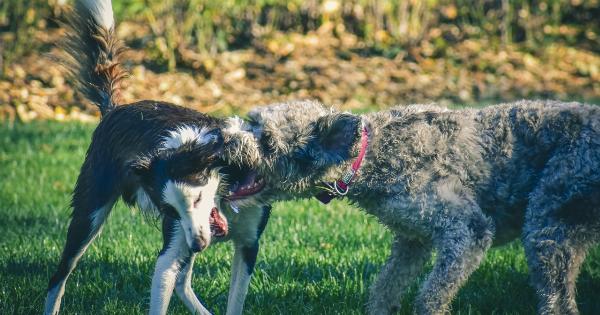Canine aggression is a serious problem that many dog owners face. It can be a result of various factors, including genetics, environment, and nutrition. In this article, we will explore the relationship between canine aggression and nutrition choices.
Understanding Canine Aggression
Aggression in dogs can manifest in many different ways, including growling, barking, snapping, and biting. It can be directed towards humans or other animals, and it can range from mild to severe.
Aggression is not a breed-specific trait and can be seen in any dog, regardless of its size or breed.
Factors Influencing Canine Aggression
Several factors can contribute to canine aggression, and one of them is nutrition. The food a dog consumes plays a crucial role in its overall health and behavior.
Poor nutrition or a diet lacking essential nutrients can lead to imbalances in the dog’s body, which may increase the likelihood of aggressive behavior.
The Role of Nutrients in Aggression
Nutrients such as protein, carbohydrates, fats, vitamins, and minerals are vital for a dog’s physical and mental well-being. A deficiency or imbalance in any of these nutrients can impact a dog’s behavior, including aggression.
Let’s delve into some specific nutrients and their role in canine aggression:.
Protein
Protein is an essential component of a dog’s diet, as it provides the necessary amino acids for muscle growth, repair, and overall health.
A lack of protein in a dog’s diet can result in decreased serotonin levels, which may contribute to aggressive behavior.
Omega-3 Fatty Acids
Omega-3 fatty acids, found in fish oil and certain plant sources, have been associated with numerous health benefits for dogs. These fatty acids play a crucial role in brain development and function.
Studies have shown that a deficiency in omega-3 fatty acids can lead to increased aggressive behavior in dogs.
Vitamins and Minerals
Vitamins and minerals are essential for various bodily functions, including neurological processes.
Deficiencies in certain vitamins or minerals, such as vitamin B6, vitamin D, or magnesium, can affect a dog’s behavior and increase the risk of aggression.
Feeding Practices and Aggression
Aside from specific nutrients, the overall feeding practices of a dog can also contribute to aggression.
Factors such as feeding frequency, portion control, and the presence of high levels of additives or preservatives in commercial dog food can all influence a dog’s behavior.
Commercial Dog Food and Aggression
Many commercial dog foods on the market contain ingredients that may negatively impact a dog’s behavior. These may include artificial additives, preservatives, or low-quality protein sources.
It is essential to carefully read and understand the ingredients in a dog food before making a decision.
Choosing the Right Diet
To mitigate canine aggression, it is crucial to choose a well-balanced and nutritious diet for your dog. Here are some tips:.
1. Consult with a Veterinarian
A veterinarian can provide valuable insights into your dog’s nutritional requirements and recommend suitable diets that promote a calm and non-aggressive demeanor.
2. Avoid Artificial Additives
Look for dog food options that are free from artificial additives, colors, and preservatives. These additives can potentially worsen aggressive behavior in dogs.
3. Look for High-Quality Protein Sources
Ensure that the dog food you choose includes high-quality protein sources like chicken, beef, or fish. Adequate protein levels can help maintain a healthy and balanced neurotransmitter function in the brain.
4. Consider Natural and Organic Options
Natural or organic dog food options often contain fewer artificial ingredients and are made from higher quality sources. These can be beneficial for dogs prone to aggression.
5. Speak to a Professional Dog Trainer
In addition to nutrition choices, seeking professional help from a dog trainer experienced in dealing with aggression can provide valuable guidance and training techniques to address the underlying causes of aggression.
Conclusion
Incorporating proper nutrition choices into a dog’s diet is essential in managing and reducing canine aggression.
By providing a well-balanced diet rich in essential nutrients, avoiding artificial additives, and considering natural options, dog owners can significantly contribute to their pet’s overall well-being and minimize aggressive behavior. Remember, consulting with a veterinarian and seeking professional help from a dog trainer when dealing with aggression is crucial for finding the best solution for your furry friend.




























